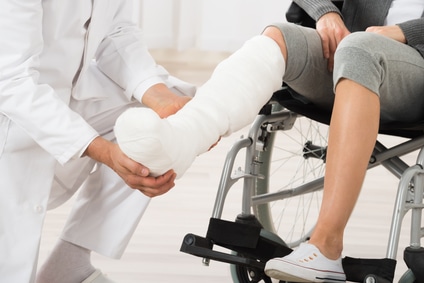Leg injuries can be some of the most difficult and frustrating workers’ compensation injuries. They affect your ability to stand, walk, and squat. This article will discuss some of the specific issues associated with hip, knee, and ankle injuries. Since it is not written by a doctor, it is not intended as medical advice. Instead, it is intended to provide you with some helpful information about Georgia workers’ compensation claims for leg injuries.
Getting medical treatment for a leg injury
When you suffer a leg injury (or any other type of injury), one of the first things you should do is tell your employer. Georgia law requires you to give notice of your injury. When you do so, your employer should provide you with a list of doctors (otherwise known as a panel of physicians) to treat your injury and you should be able to choose from that list.
The employer’s panel of physicians should include at least one doctor who specializes in orthopedics. If you have an injury to a hip, knee, or ankle, you will generally need to see an orthopedic specialist at some point, but you may not have to choose that doctor as your initial doctor. Remember that the doctor that you choose as your authorized treating physician can refer you to a specialist if needed.
What medical treatment will I need?
The medical treatment you need will certainly depend on the type of injury you suffer. The doctor you choose will likely perform x-rays. These help the doctor determine if you have a fracture. If there is no fracture, you will likely be treated with medication and physical therapy. If you continue to have problems, the doctor may order other diagnostic tests like an MRI. MRIs often show problems, like a torn ACL or MCL ligament in a knee, that cannot be seen with x-rays. Sometimes, the doctor needs to do surgery to repair the problem so you can recover from your injury.
How a leg injury can affect your work
The doctor will usually give an opinion about whether you should be working or not. Sometimes, the doctor will allow you to work but place restrictions on what you can do at work. Leg injuries often make it difficult to return to work. Many jobs require you to spend a lot of time standing or walking.
When you have an injury to your hip, knee, or ankle, it can be very difficult to stand for a long time or walk long distances. Driving can be difficult as well.
Because of this, the may limit the time you can stand or walk and the amount you can lift. These restrictions could prevent you from working. If your injury prevents you from working, the insurance company should pay you temporary total disability benefits.
You may very well find that you still have problems with your leg injury even after you get all the medical treatment you need. Often, injuries to hips, knees, and ankles lead to some form of permanent impairment.
In other words, your leg may not be as good as it was before the injury even though the doctor has done everything he or she can do. This could affect your ability to go back to work now or it may affect your ability to work in the future.
If you cannot go back to work, the insurance company will probably have to keep paying you temporary total disability benefits. However, there are limits on how long you can receive those benefits in Georgia.
What if I have questions about my leg injury?
Serious leg injuries have lasting consequences that can affect your ability to earn a living and support your family. If you are injured, it is important to make sure that you look out for yourself and know your rights.
Many people are unsure what to do. Talking to an attorney may help. I provide free consultations in workers’ compensation cases so people can find if I can help them.










